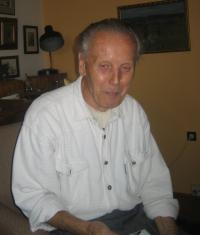I have never forgiven the communists for August 1968

Download image
Václav Pražák was born July 27, 1928 in Nechanice. He had a happy childhood in the village until the outbreak of the Second World War. In 1944, he and his fellow students from the trade academy, had to do forced labour in the nearby Škoda factory. At first he was digging trenches and then he worked as a helper in the foundry. After the liberation he completed his school-leaving exams and in 1950 he began his basic military service in the border region. Thanks to his talent for sports he was successful in the army and he was at first offered to study at an NCO school and subsequently at a school for reserve officers. He passed the final exams with excellent marks, and he was promoted to the second lieutenant’s rank. After his further activity in the army, he was summoned to the Ministry of Defence in Prague, where he was offered participation in a non-specified mission. He agreed and he underwent demanding training which also included an English language course. It was only later that he learnt the exact location of his mission - the Korean peninsula. He set out for the mission in 1953. Together with about 250 soldiers of the Czechoslovak army they departed on a long train journey over the entire Russian and Chinese territory. Their destination was the 38th parallel and the mission’s objective was international monitoring of the enforcement of the armistice treaty. He served at various posts in the Korean peninsula, and after nearly one year he was eventually allowed to return home with the last group of Czechoslovak soldiers. After his return he was welcomed by his wife and his six-month old son who had been born during Václav’s mission abroad. He refused further service in the army for family reasons, and he found a job in the cultural department of the municipal administration authority. He also began to study the faculty of arts at the university. The situation changed after August 1968, when Václav Pražák took part in a regional assembly of the cultural front, which resulted in a protest resolution against the invasion of the Soviet army to Czechoslovakia. When the normalization process began soon after, he was dismissed from the Party and subsequently fired from his job. He was summoned by the disciplinary committee at the university. Thanks to his contacts he was allowed to complete his studies, but he had troubles finding a job. He eventually began working as an assistant in a decorating department. In 1988 the Party decided on his retirement, even though he wished to continue working. After the Velvet Revolution he began working in the district administration authority in Hradec Králové in the department for the protection of historic buildings, and he eventually became the head of this department. Václav Pražák died in April 2022.
